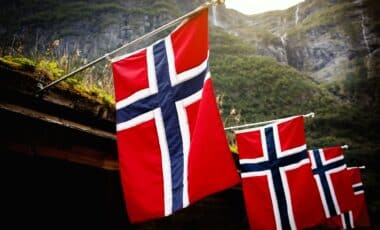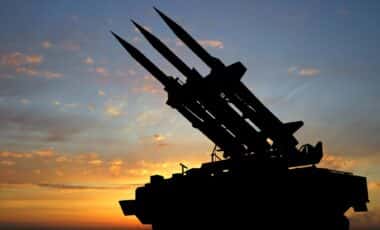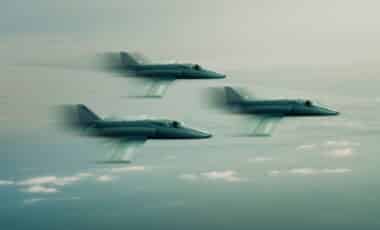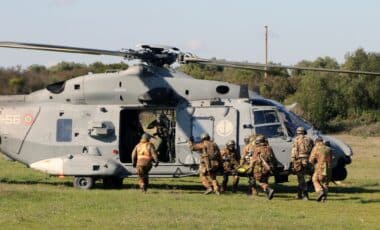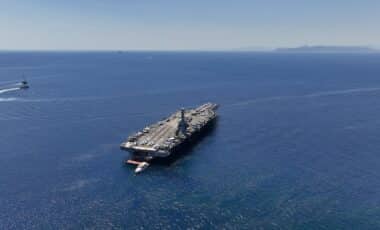Ben: When did you first develop an interest in WW2?
Jos: WWII was never far away when I grew up. My parents were teenagers during WWII and at school, the war was a frequent topic during our history lessons and discussions. So, at a very early age, I got interested in, and passionate about, WWII stories.
Ben: Being from the Netherlands, do you feel a particular kinship with the airborne, given the role of parachute and glider troops in Market Garden?
Jos: Being an infantry soldier myself, I feel a bond with all soldiers from every nation, and I greatly respect and admire all other soldiers. But, I was in our Air Mobile Brigade during my career and therefore I know how dangerous these operations are when you are deployed on an “island with enemy troops surrounding you.” For that reason, I feel a special kind of relationship with the paratroopers and glider men, remembering what these courageous men did to free our nation.
Ben: How did you first meet the men whom you interviewed for your book? Did you seek them out with this project in mind, or did the idea grown once you met them?
Jos: In September 2016, I was honored to support a visit of WWII veterans to the Netherlands. The visit was during the commemoration period of the Market Garden Operations. Jim ‘Pee Wee’ Martin (George Company, 506 PIR) and Dick Klein (HQ Company, Third Battalion, 501st PIR), whose stories are in the book, were part of this group. The WWII stories of these paratroopers, as well as of others in the group like Guy Whidden of the 502nd PIR, ignited the flame in me again and were the reason I wanted to write a book which contained the stories of WWII paratroopers. Not only because of the awesome stories these men told me during their visit to our country, but also because of their warm, kind, and humble personalities that inspired me.
Ben: Did your own experiences in the military inform how you developed a relationship with the men you interviewed?
Jos: The fact that you yourself serve (I am still on active duty) makes it easier to understand the stories, not only the facts and the context but also the impact war has on a soldier. During the interview, therefore, you can not only discuss what has happened but also help to go through some of the emotions the men have and help them cope with it. There is a mutual background and, of course, respect which probably gives a certain bond between soldiers from all nations which helps to become friends easier. Brothers in Arms!
Ben: Did you learn anything that surprised you while working on the book? A fact you had not known previously?
Jos: During my research, I came across this thesis: “American Soldiers and POW Killing in the European Theater of World War II”. As a psychologist, I am always curious about human nature and the way people act and react, especially soldiers in a war. This research gave me a lot of insight into the nature of why these incidents happened during WWII. Being a soldier myself, I understand these situations. During a war, not all situations are answered in the best possible way or most rational way. War is never easy otherwise boy scouts (with all respect for boy scouts) would also be able to do the job and not just highly trained and professional soldiers who in some situations also show to be human and act accordingly. I am not saying it is right to kill other soldiers for what seems to be no good or rational reason and act in a way that is not in line with the Geneva Conventions. I do understand why and how it happens.
Ben: How did you get started with your interviews? Was it in person, or through correspondence?
Jos: After doing my research at home for about five months and setting interview dates and making travel arrangements in the winter of 2017. I traveled abroad to the U.S. where I visited each trooper at home to do the interviews. After I returned home, I started writing my first draft. Whenever I ran into a situation that needed some extra clarification I would call Jim, Dick, or Dan. We are still in good contact, as I call them about every two weeks. Despite that dreadful virus, I am happy to say all three troopers are doing well.
Ben: Was it difficult to overcome living in a different country than the people you were interviewing?
Jos: No, not at all. Nowadays, with the internet (Skype or Facetime) it is very easy to stay in touch. It is also easy to keep in touch with several others who helped me throughout the research and writing process like Mark Bando, Ian Gardner, Kevin Price, and Dan Crews. These are just a few of the men that helped me enormously over the years and I am still grateful for all the support I received from all who helped me get the project done. By the way, for all who read this: the proceeds of the book are donated to the Patriot Foundation and Screaming Eagle Foundation, who support children of U.S. veterans with scholarships. So, please, buy a book not only for reading the great historical value but also because you give some children a better future.
Ben: Have any authors or historians influence your writing style or research methods?
Jos: You could say that I am “internationally” influenced. Reading is a hobby and over the years I have read numerous books, not only historical or military books, both in Dutch and English. I like to read biographies, for instance, like those written about Mahatma Gandhi (Ramachandra Guha) or Nelson Mandela, people who inspired me. I have read many books of great Dutch authors like Simon Vestdijk and Jan Wolkers. But of course, military (historical) books are my favorite. Authors like Karl Marlantes (Matterhorn), Carlo D’Este (his biographies about Patton, Eisenhower, and Churchill are outstanding), Ernest Hemingway (A Farewell to Arms), Philip Caputo (A Rumor of War), William Manchester (Goodbye Darkness), Storm of Steel (in German: In Stahlgewittern, the memoir of German WWI officer Ernst Jünger), Roland Dorgelès (Les Croix de Bois, or ‘Wooden Crosses’), Robert Graves (Good-bye to All That), Robert Leckie (Helmet for my Pillow), Eugene Sledge (With the Old Breed), and Geoffrey Perret (Old Soldiers Never Die, the life of Douglas MacArthur). The list is long and our house is filled with books as my wife is also an avid reader! I must say that “Matterhorn” and “With the Old Breed” are on the top of my list, which has nothing to do with my own background within the Dutch Marine Corps!
Ben: How long did it take you to write your book?
Jos: About three and a half years. During that period, I was also doing my day time job as I am still on active duty and I was also busy promoting the book in various ways as well as choosing the foundations who will profit from the proceeds.
Ben: How did you go about trying to get published?
Jos: That is a difficult part. If I had picked a publisher (and if had found one who was willing to publish the book) I may have saved a lot of time in regards to editing and promoting the book. On the other hand, using a publisher would mean I would lose a lot of the proceeds. Therefore, I chose to self publish. The problem now is, which I have learned recently, that no one in the U.S., no media whatsoever (even Veteran Radio Stations that I have contacted) are willing to pay any attention to the book and the project, unfortunately. Self-published books seem to be not worthy to get attention or writing a review in regular media like newspapers.
Ben: What was the hardest aspect of writing this book?
Jos: English is not my native language, so I have to invest a lot of time getting the grammar right. Still, as with the Dutch books I wrote, it is hard work, writing. You write, re-write and re-write, over and over again. The interviews are the fun part but if you put them in perspective with all the other hours I have spent getting the book done, that was time-wise very short but an unforgettable experience. I am so honored to have been able to spend these hours with the veterans. I feel very blessed!
Ben: Did you find anything that was surprisingly easy about writing?
Jos: Getting support from some of my friends in the U.S., knowing how busy they also are. It was heartwarming how some of my newly made friends were willing to support me all the way. I feel very fortunate to have found some people who are also really committed to honoring and showing respect for the WWII generation and who are willing to support projects like mine wholeheartedly.
Ben: How did you get involved with the charities that benefit from the sale of your book?
Jos: I was already thinking of supporting veteran’s children when I first got in touch with the Screaming Eagle Foundation in 2018. As they were in touch with the Patriot Foundation I decided to also support them with the proceeds as they have the same goals as the Screaming Eagle Foundation, but they support several other units also besides the 101st, which means it broadens the possibilities.
Ben: Do you have any advice for people who might be interested in starting to write, particularly how to conduct an oral history project?
Jos: Make sure you have enough time and energy at hand and if you do this beside your work and your relation and/or marriage (with or without children): make sure they support your ideas as the time you have at hand to spend with the family is greatly diminished. If you are interested in oral history projects and you are a good interviewer, I would urge anybody to start doing it as we are losing many stories of great historical importance every day as people pass away all the time. But at the moment, we are losing many of the WWII generations, unfortunately. So, go and interview these veterans, record it and put it in a database, or better: write a book about their stories.
During the interview, Ben asked Jos if a specific story from the book have an impact on him. Jos responded by allowing the words of 502nd PIR veteran Dan McBride to speak for him, particularly “the story of the German attack on January 3, 1945, at Dan McBride’s position. The battle and how it affected Dan as well as how he described what he saw when it had ended. The reality of war, how grim and cruel war is.”
I saw the German infantry accompanied by the tanks coming towards us. I saw tanks being knocked out while I was banging away with my machine gun at the German infantry. Soldiers were going down, but I did not know if I had hit them or not because they would also drop if a bullet flew by the close. One thing happened after another, and it all seemed to go by in slow motion. It felt like the attack had lasted a month, but it might have been no more than half an hour or so.
It was a bizarre feeling when the assault ended. I cannot recall too many details of what had happened as I was totally focused on my own actions. The only thing I saw was the advancing Germans in front of my foxhole, and I felt the machine gun constantly kicking my shoulder. The German infantry who made the attack came at us in large numbers and got real close to my foxhole. Every once in awhile I would swing the gun and fire at one of the tanks, where infantry ran behind. If I was lucky, I might have hit one of the tank crew members, but I do not think I ever did. I must have been holding the trigger continuously because I was going through ammunition at a high rate. The gun was getting red hot, and I could see the tracers going in all directions. I think the rifling was completely shot out of the barrel.
To my surprise, the attack was suddenly over. I backed away from the gun, but the gun was still firing, and my finger was not even on the trigger. Every time another shell replaced the one that had just left. Due to the immense heat of the machine gun’s barrel, it was automatically setting the weapon off. I sat there, and the gun would go “bang,” pause for a second and go “bang,” as another one went off. I unloaded the machine gun, removing the ammo belt, set back, and started crying like a baby. I tried to light a cigarette, but I almost stuck it in my ear. My body was shaking uncontrollably, like a leaf on a tree during a storm. Blasingame was close to me, and he asked me how I was doing. I told him I was fine. “Some fight,” he said. I could only nod in agreement with him.
There was a burning tank standing right in front of my foxhole that was knocked out by one of “Calfboy” Blasingame’s bazookas during the fight, and I could hear someone inside, screaming for his life. The tank was not more than 30 yards away from me, and the guy inside kept screaming on and on until his voice died away.
The battlefield before my foxhole was a sorry sight to see, which was something I never forgot. There were dead-panzer grenadiers in their black uniforms littered all around in the snow. It looked like somebody had spread black pepper on a piece of white bread. Some of our guys were walking around looking to see if they could find something useful from these dead Germans. I did not know if all of them were killed, and I must admit I did not care at the time. I was not in the mood to look at those dead Germans. I was happy to have survived that ordeal and stayed in my damn hole.
Copyright © 2019 by JMH Groen. Excerpted with permission.
[amazon box=”1792311346″ template=”horizontal”]


